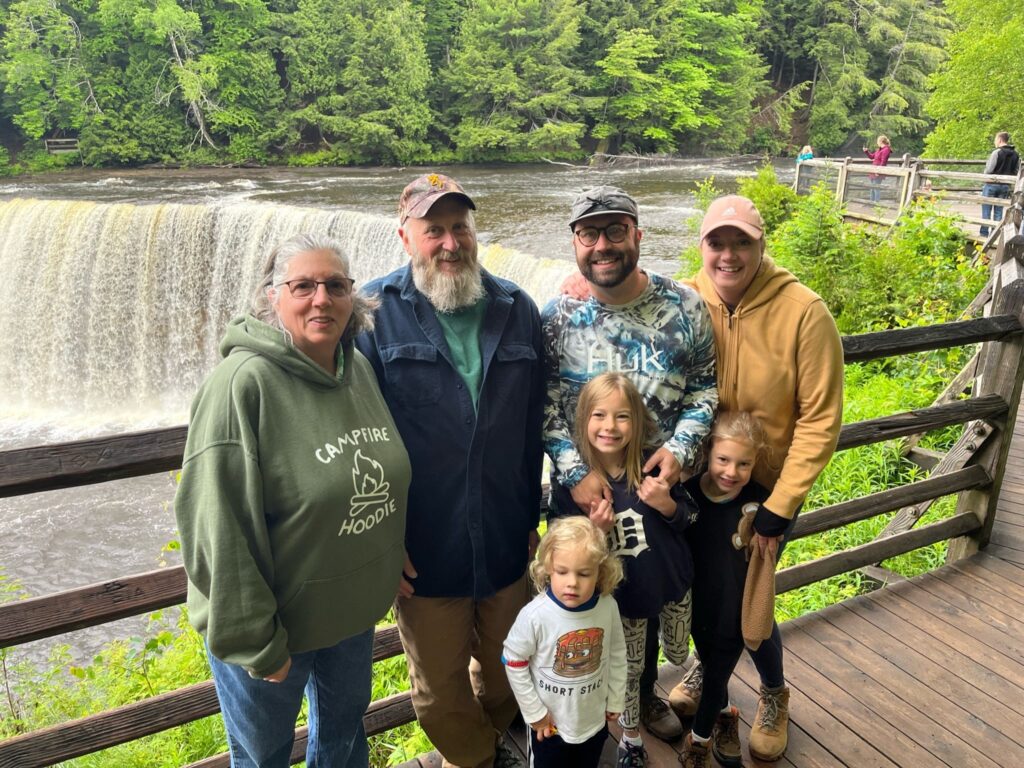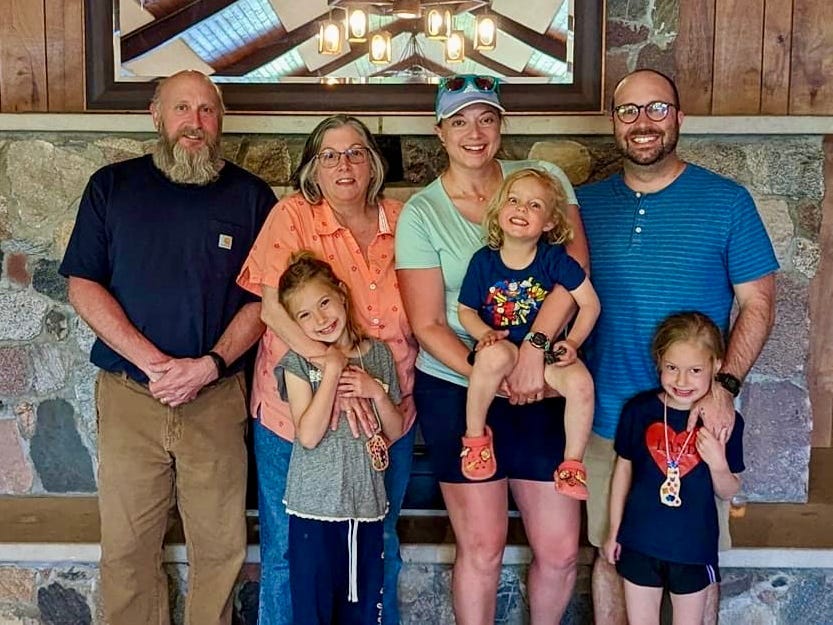- Megan Moore, 33, lives in her childhood home with her parents, husband, and 3 kids.
- The arrangement was supposed to last around 2 years until the daughter and son-in-law found their feet.
- It's lasted a decade and counting. Moore and her mom shared the rewards — and challenges.
Megan Moore scrolled through her phone as she heard squeals of laughter coming from downstairs, where her parents were busy doing crafts with her three children.
She couldn't help feeling guilty. "Other moms probably don't get this time to chill out," she thought. "Am I having less parenting experience because I'm imposing on my folks?"
While it was "an internal struggle," the 33-year-old told Business Insider, she was grateful to hold such a privileged position. For the past 11 years, her baby boomer parents, Ramona and Jim Grills have lived in the same house and been able to watch the kids 24/7 if needed.
As for her mom, Grills said she was happy to babysit. She said it didn't make sense for Moore to pay a stranger when she loved her grandchildren so much and being with them kept her young.
Their intergenerational household is a part of an increasing trend as more millennials cohabit with their parents. The arrangement is a sensible option for many millennial parents dealing with the cost-of-living crisis, particularly when they need childcare.
The shared living arrangement was initially a stop-gap
Still, it presents challenges. Neither Moore nor Grills is Pollyanna-ish about the situation. Grills, 62, said she readily escapes to her vacation home when "she's done" looking after the children.
Moore said she enjoyed having space when her parents were away. "We tend not to entertain when they're here," she added. "It feels like we're infringing on them because they're confined to their bedroom."
She and her husband, Luke, also 33, never imagined they would still live with the Grills so many years after moving in. Everyone thought it was a stop-gap while the newlyweds and recent college graduates "found their feet" in 2013, she said.

"It made sense," Moore, who was paying off student loans, said. Luke was pursuing a Master's degree. The Grills didn't charge rent.
"Dad said, 'You're young, you don't have stable jobs yet, so let us help you,'" Moore added. "He said, 'We don't want you spending all this money that you don't have.'"
He said the same thing when the couple, who met at high school, got pregnant in 2014 with their first child, River, now 9. The Moores had begun to look at apartments. "I thought mom and Dad were done with their parenting years," Moore said.
It was quite the reverse. Her dad, who wanted to be a hands-on grandfather, said, "Wait a minute! Why are you rushing to leave when you're having a baby?" Moore asked herself the same question. "There was no tension or feeling that we didn't belong, so it naturally progressed," she said, noting that they started to pay their way after a few months.
Moore's parents don't have a separate living space in the home
She gave birth to their second daughter, Phoebe, in 2018 and son, Barrett, in 2020. Her mom, who retired as a special needs teacher in 2019, babysits Barrett twice weekly when he's not at nursery. She also picks up the girls and often takes them to after-school activities.
As for the living arrangements, the Grills don't have a separate "in-laws" area at the house. They have an assigned bedroom and bathroom but share other spaces, such as the kitchen, dining and living room.
Grills told BI that her son-in-law, "a phenomenal chef," tends to cook; she does the kids' laundry and the dishes. Moore and her father are mostly responsible for cleaning. "We all pull our weight," she said.
She said the generations were on the same page over disciplining children. "There are timeouts, not spankings," Grills said, adding that she wouldn't dream of undermining the parents' authority in front of their kids.

Moore said the children benefited from living with their grandparents in some charming ways. "They like music like AC/DC and Pink Floyd," she said. "They'll watch black-and-white films from the 40s and 50s with my mom, who loves Doris Day.
"There is an extra set of hands to help with homework or play. With four adults and three kids, there's always someone around who can give them 1:1 attention."
The Grills recently sold the house to their daughter and son-in-law because "it made financial sense" when house prices have risen so much. The Grills don't pay rent, but bills are split.
Moore told BI she'd previously considered their circumstances unusual. But, after speaking with her contemporaries, she now realized how common they were.
Moore plans to keep living with her parents
"I used to dance around our living situation because I thought people might think it had weird connotations, like a guy living in his mom's basement," Moore, a university employee, said. "Then, with the pandemic, the lack of affordable housing, and the rising cost of living, communal living became popular out of necessity.

"After that, once people did it out of necessity, they thought, 'Actually, this is great. Why have we never done this before?"
Grills told BI that the family had no intention of living apart. "I'm not planning on leaving this house until I die, " she said.
Moore said the best opportunity to thank her parents for their support in the past would come in the future.
"Mom and Dad wanted to help us when they were established. Now they're older, don't have a steady income, and might have health issues, we tell them the same thing: 'Let us take care of you like you took care of us.'"
Do you have a powerful story to share with Business Insider? Please send details to [email protected].
